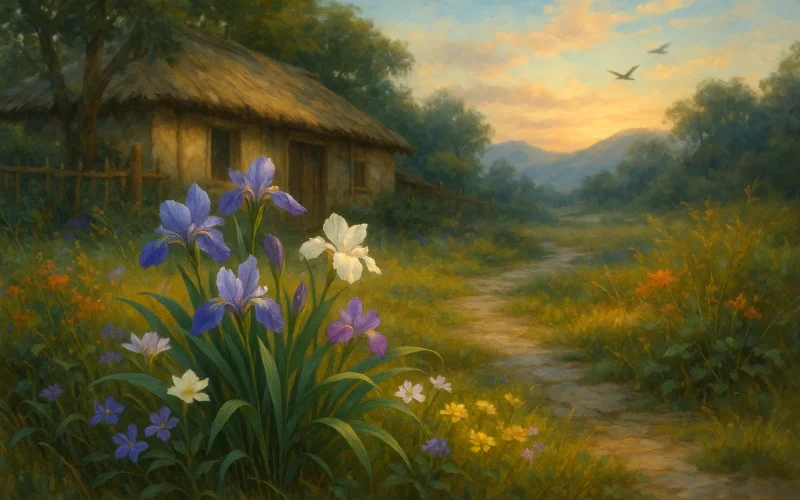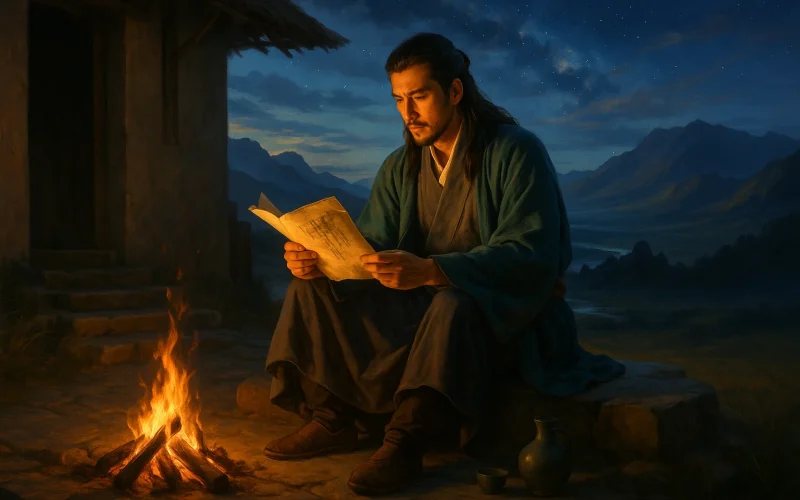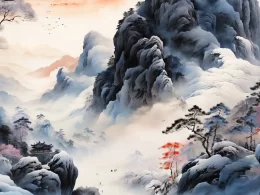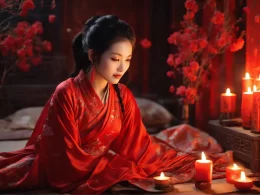Underfed for long in my native land,
I left the hoe to take the pen in hand.
I had not enough to feed my household.
Could we not suffer from hunger and cold?
When I was nearly thirty years of age,
I felt ashamed to face the ancient sage.
Then I resolved to go my former way
To live a rural life to end my day.
Star on star breathes an air current high;
Year by year a dozen springs have gone by.
The way of the world is so wide and long,
Even a philosopher would go wrong.
Though I have no gold to provide a feast,
I may drink cups of home-made wine at least.
Original Poem
「饮酒 · 其十九」
陶渊明
畴昔苦长饥,投耒去学仕。
将养不得节,冻馁固缠己。
是时向立年,志意多所耻。
遂尽介然分,终死归田里。
冉冉星气流,亭亭复一纪。
世路廓悠悠,杨朱所以止。
虽无挥金事,浊酒聊可恃。
Interpretation
Written years after Tao Yuanming's resignation from official life, this poem reflects on his sustained farming existence—materially poor yet spiritually fortified. Revisiting his earlier compromise of taking office for survival, he examines past struggles and shame while reaffirming his unwavering commitment to reclusion. The work's solemn sincerity and introspective depth mark it as another philosophical summation of Tao's post-retirement worldview.
First Couplet: "畴昔苦长饥,投耒去学仕。"
Chóu xī kǔ cháng jī, tóu lěi qù xué shì.
Years ago, plagued by endless hunger's sting, I cast my plow aside to serve the king.
The verb "cast aside" (投耒) emphasizes the wrenching nature of abandoning farming for office—a surrender to necessity rather than choice.
Second Couplet: "将养不得节,冻馁固缠己。"
Jiāng yǎng bù dé jié, dòng něi gù chán jǐ.
Official robes brought no reprieve— Cold and hunger never leave.
The paradox of bureaucratic position failing to alleviate poverty underscores the futility of his compromise.
Third Couplet: "是时向立年,志意多所耻。"
Shì shí xiàng lì nián, zhì yì duō suǒ chǐ.
Approaching thirty, so-called prime, My compromised soul knew its crime.
"Thirty" (立年) highlights Confucian expectations of established life, making his shame at moral concession more acute.
Fourth Couplet: "遂尽介然分,终死归田里。"
Suì jìn jiè rán fèn, zhōng sǐ guī tián lǐ.
Thus I reclaimed my stubborn part: To die content in fields, not court.
"Stubborn integrity" (介然分) becomes his defining vow, with "die in fields" (终死归田) signaling irreversible commitment.
Fifth Couplet: "冉冉星气流,亭亭复一纪。"
Rǎn rǎn xīng qì liú, tíng tíng fù yī jì.
Star currents drift in ceaseless flight, Twelve more years have graced my sight.
Celestial imagery ("star currents") temporalizes his perseverance, measuring spiritual constancy against cosmic flow.
Sixth Couplet: "世路廓悠悠,杨朱所以止。"
Shì lù kuò yōu yōu, Yáng Zhū suǒ yǐ zhǐ.
World's roads stretch vast and dimly lit— Hence Yang Zhu refused to tread it.
The ancient philosopher Yang Zhu's legendary refusal to compromise mirrors Tao's own principled halt at life's crossroads.
Seventh Couplet: "虽无挥金事,浊酒聊可恃。"
Suī wú huī jīn shì, zhuó jiǔ liáo kě shì.
No gold to scatter in display, But humble wine sustains my way.
The humble "turbid wine" (浊酒) becomes symbolic recompense—a modest yet sufficient spiritual anchor.
Holistic Appreciation
This poem chronicles the pivotal transitions in Tao Yuanming's life: from farming to officialdom, and ultimately to reclusion. With remarkable candor, the poet recounts how poverty once drove him from agrarian life into government service, only to find greater hardship and shame in bureaucracy. This experience ultimately clarified his path, leading to his resolute return to rural simplicity and harmony with nature. The latter portion, contemplating time's passage and philosophical transcendence, reveals his serene detachment from worldly pursuits. More than mere autobiography, this work stands as a testament to idealistic perseverance and personal authenticity.
Artistic Features
The poem's language achieves profound impact through unadorned simplicity, exemplifying Tao's signature sincerity. His plainspoken narration of internal conflicts allows readers to perceive deep emotion and steadfast conviction without rhetorical artifice. Structurally, it progresses seamlessly from reluctant official service (1) to determined reclusion (2), then through temporal reflection (3) to philosophical resolution (4). The strategic allusion to Yang Zhu's famous hesitation ("杨朱所以止") elevates personal choice to universal meditation, enhancing the poem's intellectual depth and emotional resonance through economical classical reference.
Insights
This work illuminates how true contentment derives not from wealth or status, but from fidelity to one's essential nature. Faced with the perennial conflict between material pressures and spiritual aspirations, Tao's choice commands respect—his lifelong commitment to "returning to gardens and fields" demonstrates how maintaining初心 (original aspirations) amidst poverty constitutes its own nobility. For modern readers navigating chaotic times, the poem offers enduring wisdom: only through inner stillness can one perceive life's true destination.
Poem translator
Xu Yuanchong (许渊冲)
About the poet

Tao Yuanming(陶渊明), 365 – 427 CE, was a poet, literary figure, fu writer, and essayist active during the late Eastern Jin and early Liu Song dynasties. Born in Chaisang (near present-day Jiujiang, Jiangxi Province), he pioneered a new genre of pastoral-themed literature, expressing profound philosophical insights through simple language. His poetic style became an enduring aesthetic standard in classical Chinese poetry.











